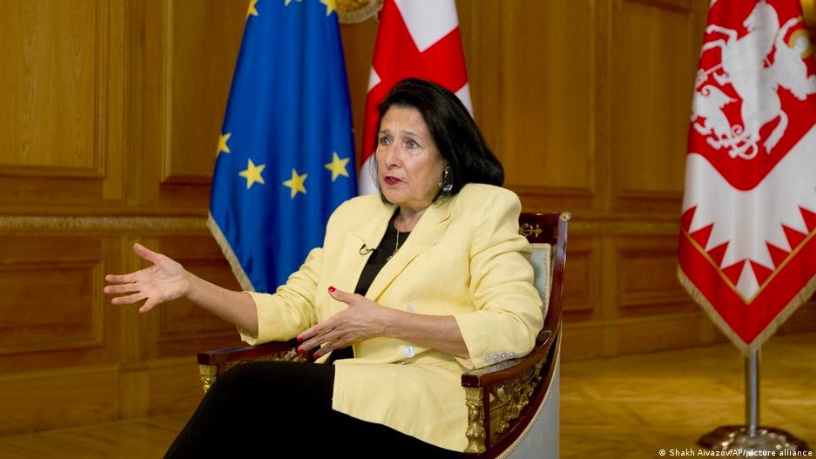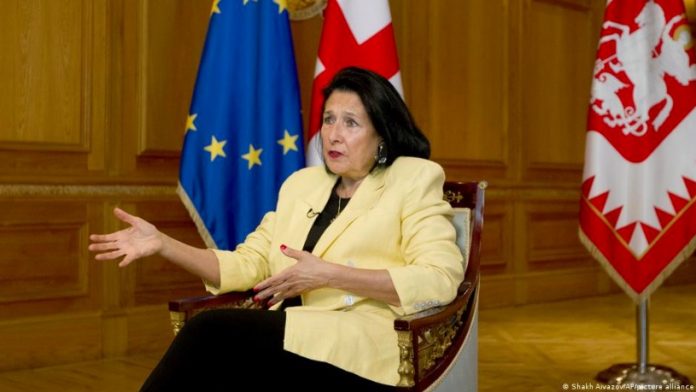ประธานาธิบดีจอร์เจียวีโต้กฎหมาย “ตัวแทนต่างชาติ” ที่เป็นที่ถกเถียง ซึ่งกระตุ้นให้เกิดการประท้วงครั้งใหญ่หลายสัปดาห์ก่อน เมื่อวันอังคาร สมาชิกสภาผู้แทนราษฎรผ่านร่างกฎหมายดังกล่าว ซึ่งกำหนดให้องค์กรพัฒนาเอกชนและสื่ออิสระได้รับเงินทุนมากกว่า 20% จากผู้บริจาคจากต่างประเทศ เพื่อจดทะเบียนเป็นองค์กรที่ “มีผลประโยชน์จากมหาอำนาจต่างชาติ” ประธานาธิบดีจอร์เจีย ซาโลเม ซูราบิชวิลี (Salome Zourabichvili) ระบุว่ากฎหมายดังกล่าวถือเป็นรูปแบบ “รัสเซียโดยพื้นฐาน” ทั้งในสาระสำคัญและจิตวิญญาณ และเป็นอุปสรรคต่อความปรารถนาในการเป็นสมาชิกสหภาพยุโรปของจอร์เจีย อย่างไรก็ตาม การยับยั้งของเธอส่วนใหญ่เป็นเชิงสัญลักษณ์ทางการเมือง เนื่องจากพรรคจอร์เจียนดรีมที่ปกครองอยู่มีสมาชิกรัฐสภามากพอที่จะลงคะแนนเสียงอีกครั้ง
ในการปราศรัยทางโทรทัศน์เมื่อวันเสาร์ ประธานาธิบดีประกาศว่าการยับยั้งของเธอนั้นชอบธรรมตามกฎหมาย “กฎหมายนี้ไม่สามารถเปลี่ยนแปลง ปรับปรุง หรือตกแต่งใดๆ ได้ ดังนั้นจึงเป็นการยับยั้งอย่างตรงไปตรงมา กฎหมายนี้จะต้องถูกยกเลิก” เธอกล่าว ประธานาธิบดีซูราบิชวิลี ซึ่งเป็นศัตรูของนายกรัฐมนตรีของจอร์เจีย อิราคลี โคบาคิดเซ (Irakli Kobakhidze) เธอได้รับการคาดหวังอย่างมากให้ยับยั้งกฎหมายดังกล่าว ขณะเดียวกัน นายกรัฐมนตรีโคบาคิดเซได้เชิญผู้ประท้วงเยาวชนให้เลือกตัวแทนอย่างน้อย 10 คนเพื่อเข้าร่วมการอภิปรายสาธารณะเกี่ยวกับกฎหมายที่เป็นข้อขัดแย้ง ตามรายงานของสำนักข่าว Interpressnews เมื่อวันศุกร์ที่ผ่านมา เขาระบุเมื่อวันศุกร์ว่า “ผมพร้อมที่จะไม่เพียงแต่ฟังคำวิจารณ์ของพวกเขาเท่านั้น แต่ในบางกรณีก็แบ่งปันด้วย ผมคาดหวังทัศนคติแบบเดียวกันจากเยาวชน”
นักวิจารณ์โต้แย้งว่ากฎหมายดังกล่าวมีต้นแบบมาจากกฎหมายเผด็จการที่ใช้โดยรัสเซียที่อยู่ใกล้เคียงเพื่อปราบปรามผู้เห็นต่าง จอร์เจียได้รับสถานะผู้สมัครสหภาพยุโรปในเดือนธันวาคม ปี 2566 และมีความกังวลว่ากฎหมายนี้อาจขัดขวางความก้าวหน้าของประเทศในการเป็นสมาชิกสหภาพยุโรป เพื่อให้มีคุณสมบัติในการเป็นสมาชิก ประเทศผู้สมัครจะต้องดำเนินการปฏิรูปการต่อต้านการทุจริต เพิ่มความโปร่งใสของรัฐบาล และสนับสนุนภาคประชาสังคม เป็นเวลาเกือบหนึ่งเดือนแล้วที่การชุมนุมต่อต้านร่างกฎหมายดังกล่าวได้แผ่ขยายไปทั่วประเทศคอเคซัส ภาพถ่ายและวิดีโอล่าสุดที่โพสต์ทางออนไลน์ดูเหมือนจะแสดงให้เห็นการปะทะกันอย่างรุนแรงระหว่างผู้ประท้วงและตำรวจ
Georgia’s president vetoes ‘foreign agent’ legislation

Georgia’s president has vetoed a contentious “foreign agent” law that has incited weeks of mass street protests. On Tuesday, MPs passed the controversial legislation, which requires NGOs and independent media receiving more than 20% of their funding from foreign donors to register as organisations “bearing the interests of a foreign power.” President Salome Zourabichvili stated that the law is “fundamentally Russian” in its essence and spirit and poses an obstacle to Georgia’s EU membership aspirations. However, her veto is largely symbolic, as the ruling Georgian Dream party has enough members in parliament to override it with another vote.
In a televised address on Saturday, the president declared her veto “legally justified.” “This law cannot be subject to any change, improvement, or embellishment; thus, it’s a straightforward veto. This law must be withdrawn,” she stated. President Zourabichvili, a known opponent of Prime Minister Irakli Kobakhidze, was widely expected to veto the law. Meanwhile, Prime Minister Kobakhidze has invited youth protesters to select at least 10 representatives to join him in a public discussion about the controversial law. According to the Interpressnews agency, he stated on Friday, “I am ready to not only listen to their critical remarks but, in specific cases, share them. I expect the same attitude from the youth.”
Critics argue that the law is modelled after authoritarian legislation used by neighbouring Russia to suppress dissent. Georgia was granted EU candidate status in December 2023, and there are concerns that this law could hinder the country’s progress toward EU membership. To qualify for membership, candidate countries must implement anti-corruption reforms, enhance government transparency, and support civil society. For nearly a month, massive rallies against the bill have swept through the Caucasus country. Recent photos and videos posted online appear to show violent clashes between protesters and police.
By BBC NEWS

















